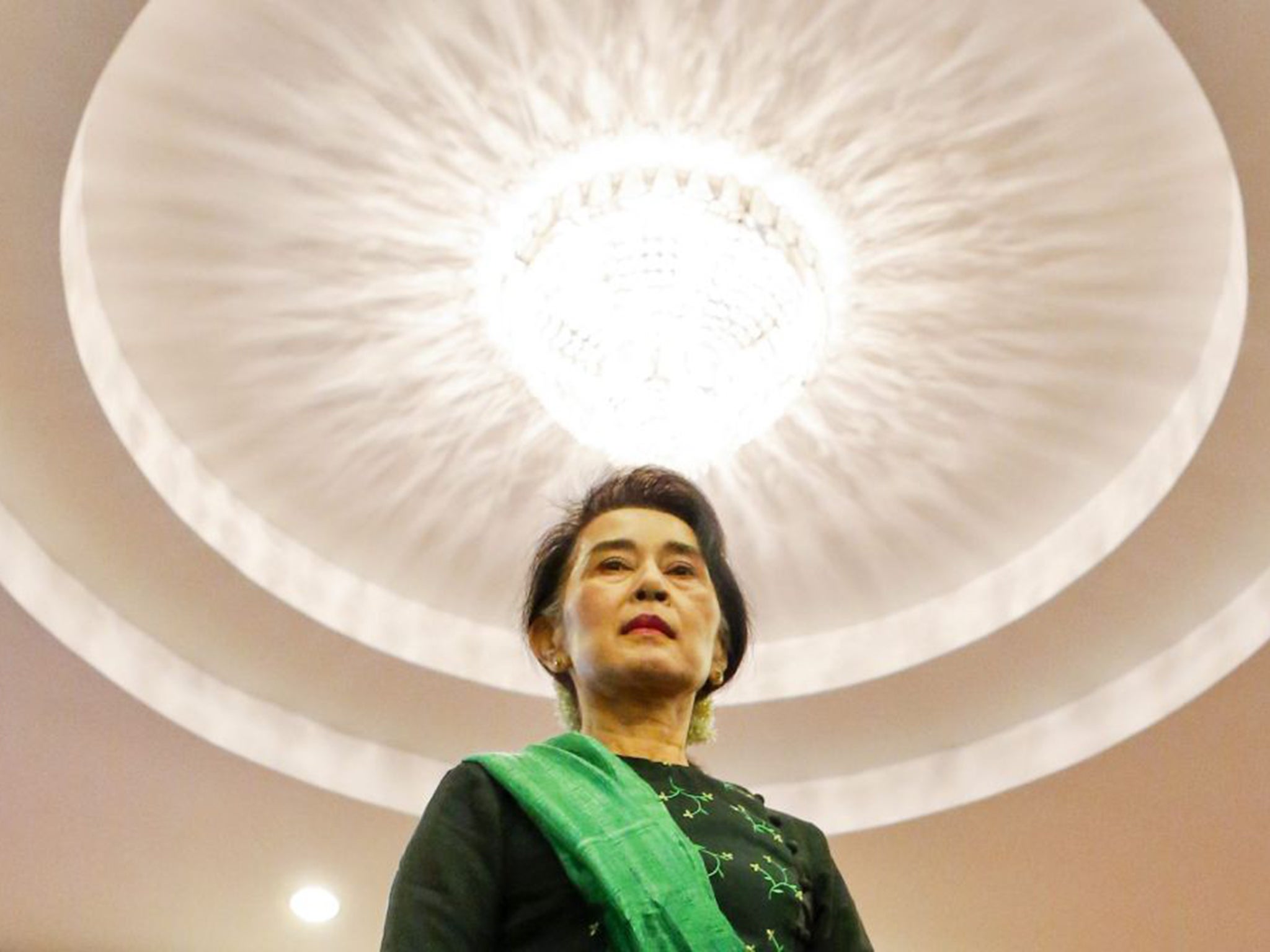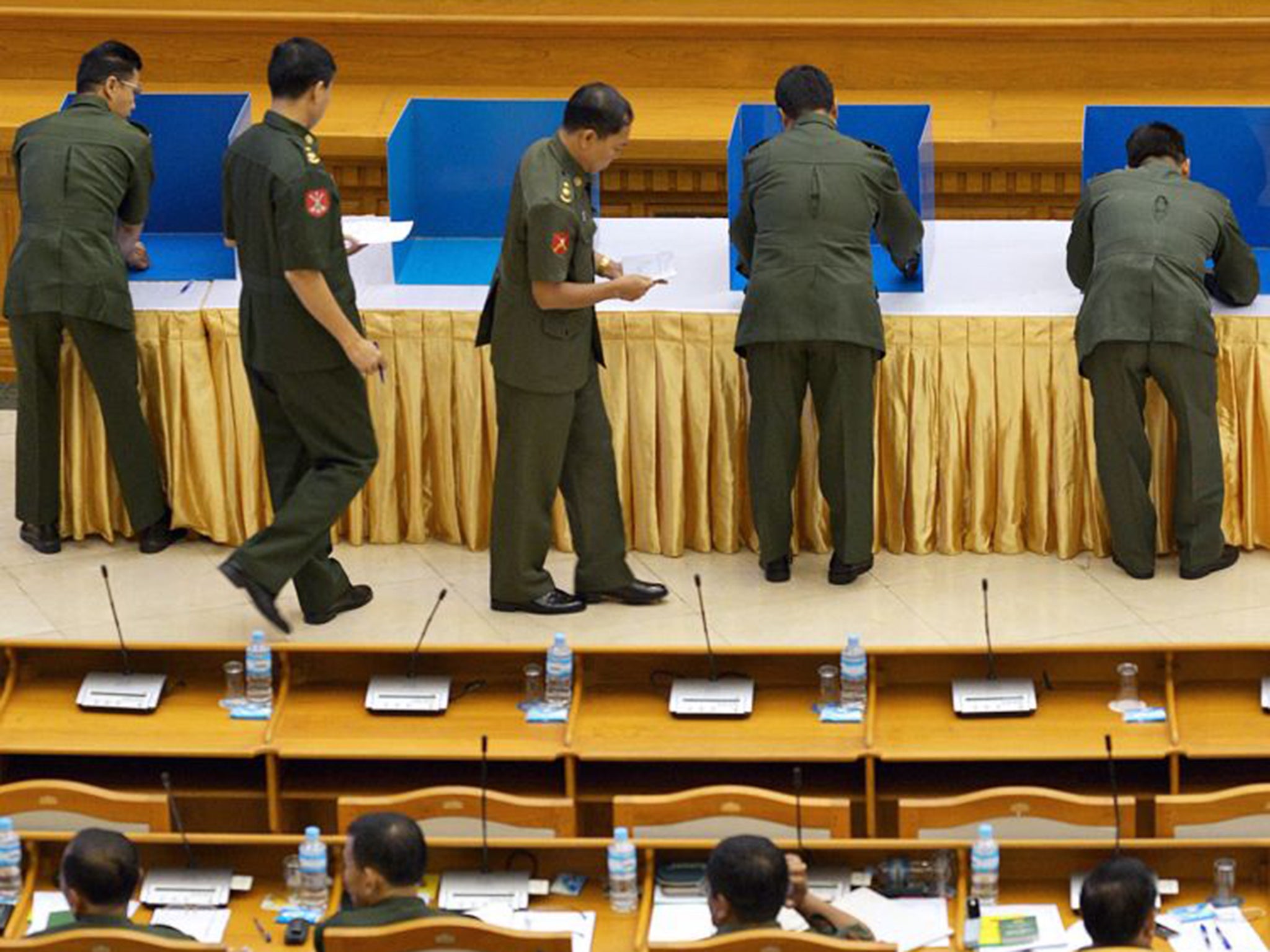Burma's army retains its iron grip on the nation by blocking Aung San Suu Kyi bid to run for president
Five million citizens demanded change to the constitution that would have allowed the popular Nobel Peace Prize-winner to run

Your support helps us to tell the story
From reproductive rights to climate change to Big Tech, The Independent is on the ground when the story is developing. Whether it's investigating the financials of Elon Musk's pro-Trump PAC or producing our latest documentary, 'The A Word', which shines a light on the American women fighting for reproductive rights, we know how important it is to parse out the facts from the messaging.
At such a critical moment in US history, we need reporters on the ground. Your donation allows us to keep sending journalists to speak to both sides of the story.
The Independent is trusted by Americans across the entire political spectrum. And unlike many other quality news outlets, we choose not to lock Americans out of our reporting and analysis with paywalls. We believe quality journalism should be available to everyone, paid for by those who can afford it.
Your support makes all the difference.Aung San Suu Kyi has effectively been barred from becoming Burma’s next president as the army, which ruled the nation with an iron fist for half a century, made clear it is still very much in charge.
The Nobel Peace Prize-winner, who remains the most popular political leader in Burma, has been trying since her election as an MP three years ago to cajole President Thein Sein into reforming a constitution which guarantees that the army retains an iron grip on power.
Her party amassed five million signatures to a petition demanding change to the constitution. But after convening a single meeting of all the major constitutional players, the President, himself an ex-general, refused to get involved any further. Now parliament has spoken, with a deafening “No”.
At issue was a sub-clause in the constitution, 59(f), which prevents anyone with a foreign spouse or relative standing for president. Ms Suu Kyi’s two sons by her late husband Michael Aris hold British passports. Her party, the National League for Democracy (NLD), argued for the removal of the section, which would have allowed her to run. The army was having none of it: the 25 per cent of MPs who are serving members of the military, wearing their uniforms to the chamber, ensured that the constitution remains unchanged.

Ms Suu Kyi, who turned 70 last Friday, now a faces diminishingly small chance of ever leading the country to whose democratic transformation she has been dedicated for nearly 30 years. Furthermore, the army’s intransigence means the end of hopes that the changes which allowed her to become an MP three years ago were the beginnings of more thoroughgoing reform.
After the vote, Ms Suu Kyi said with a trace of bitterness: “People are now crystal clear about who they have to support.” Another NLD MP, Win Myint, made the same point. “Now people clearly know who is not interested in reform and the wishes of the people. They know which party they should vote for [to achieve] democracy and reform.’
The other clause voted on made the army’s centrality even clearer.
To amend the constitution requires a vote of more than 75 per cent of MPs. As one-quarter of them are serving soldiers, at least one of them must vote for the amendment – a near impossibility, as they are under orders.
MPs in the NLD, the ethnic parties, and even the ruling Union Solidarity and Development Party (USDP), which is seen as the creature of the military, argued for a reduction in that number to 70 or 66 per cent. This would mean that it was still extremely hard to change the constitution, but not impossible, as at present. The army vetoed that change, too.
“It was a very disappointing result, I feel so sad,” an MP from the Mon ethnic minority, U Banyar Aung Moe, told The Myanmar Times. “The proposal to reduce [the threshold for approving constitutional amendments] would not have affected [the military’s] power. Now we can see that they don’t want to lose any part of their power. This is not good for the country.”
In 2011, the ruling military junta retired, replaced by a quasi-democratic regime, the product of a general election widely regarded as rigged. But thanks to the 2008 constitution, the army not only retains a stranglehold on constitutional change but also has a lock on three key ministries – defence, home and border affairs, while a Defence and Security Council can put the country under martial law at any time.
U Ko Ni, a lawyer who has advised the NLD on the constitution, told The Independent: “The minister and deputy minister of those three ministries are appointed by the chief of the army and parliament has no right to question his choice. This is a problem: it means power is still held by the military. Of course, home affairs are very important – the whole country is ruled by the home ministry.”
Even the President has no right to question the army chief’s decisions, he said. “The constitution says that the President is the head of state, but he can’t rule the country, he can’t control the police force. So many powers are held by the army chief. In effect our country is still ruled by the military.”
The point was rammed home in parliament during the constitutional debate when one of the army’s representatives gave a slide show of tanks, heavy weapons and statues of heroic soldiers. Brigadier General Tin San Naing told the chamber, “Myanmar [Burma] is still in a democratic transition. Stability and reconciliation are very important in this period and democratic practices are not mature enough yet. This is not the right time [to water down the constitution].”
The timing is crucial: in October or November Burma faces its first general election in five years. With international observers expected to pay close attention, the military will find it much harder to rig than was the case in 2010, and the NLD is expected to emerge as the largest party, though likely to be short of an absolute majority. In that event, the resistance of the army to further reforms is likely to give her party major challenges in getting anything done.
The other big issue confronting the country is a ceasefire involving the ethnic armies, which have been fighting the state sporadically ever since independence. A draft ceasefire accord was signed on 31 March, with the hopes of proceeding to a final agreement followed by talks on a political settlement this month.
The vote will make this more difficult. The armies of the Karen, Kachin, Shan and other minorities have been fighting for generations to reduce the military weight of the state and its power to control the areas where they predominate; progress towards a federal solution is hampered by mistrust of the army’s intentions.
Now the army’s intentions could not be clearer: to block change by any means.
Join our commenting forum
Join thought-provoking conversations, follow other Independent readers and see their replies
Comments